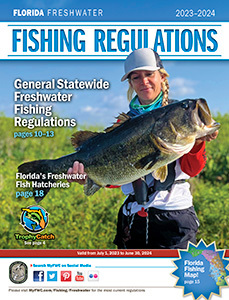Welcome to 2023-24 Florida Freshwater Fishing

Freshwater Rule Changes
- Removed specific length and bag limits for crappie, and reverted to the statewide crappie regulations of no minimum length limit and a 25-fish bag limit, on the following Fish Management Areas: Bobby Hicks Park Pond, Gadsden Park Pond, Hardee County Park, Lake Jackson (Osceola County), Largo Central Park Nature Preserve, Middle Lake, Montgomery Lake, Suwannee Lake, Walsingham Park Lake, and Watertown Lake.
- In the lower Ochlockonee River: The bag limit for striped bass is 3, only one of which may be 24 inches or longer in total length. There is no minimum length limit.
For the latest rules, always visit FLRules.org. FWC rules are in chapter 68.
Sound Research Guides the Future of Florida Fishing
By Chairman Rodney Barreto
This year the FWC’s popular TrophyCatch program is heralding its 11th season as the “Season of Research,” in celebration of the decade of data that anglers like you have contributed to our understanding of Florida largemouth bass. The designation is timely, as the FWC continues to pioneer fish management through multiple research initiatives that all contribute to practical management strategies to improve fishing.
One of the most recent is the Florida Trophy Bass Project, which focuses on producing, documenting, and promoting trophy bass and increasing your opportunities to catch a Florida trophy. Current progress and specific research strategies will be highlighted at https://myfwc.com/fishing/freshwater/fl-trophy-bass-project/ as the new program develops.
Fish stocking has long been a critical component of fish management, and the FWC’s Florida Bass Conservation Center (FBCC) and Blackwater Fish Hatchery are keystones to Florida freshwater fish research and management. The FBCC, built in 1965 and significantly upgraded in 2007, is capable of out-of-season spawning to boost annual production and pioneered raising largemouth bass fry to a larger “Phase II” size to reduce predation and greatly improve stocking survival. The Blackwater hatchery was constructed in 1938 and is the production site for FWC’s striped bass and striped bass hybrids (including sunshine bass). Recently, the Blackwater hatchery successfully completed the very first spawning and stocking of shoal bass in Florida, working toward restoring this fish’s population following the devastating effects of Hurricane Michael in 2018. You can read more about FWC’s hatcheries and the innovations their research has “spawned” in the Conservation Article.
While research-grounded regulations are another important fishery management tool, that same research and a continual rules review process sometimes eliminates regulations as well. A comprehensive black crappie (speck) rules review that is a component of the FWC’s Black Crappie Management Plan resulted in the removal of special black crappie regulations from ten waters this year (see “Freshwater Rule Changes” below). The research leading to that significant rules reduction included not only new biological data on crappie populations, but stakeholder input from you to be included in the rule-making decision process.
Circling back to TrophyCatch, you can find out more about participating in the program on Angler Recognition Programs and learn some of the research results that you may have contributed to on Trophy Catch Research Highlights. Thank you for being a part of the research that guides FWC’s management decisions for today and ensuring quality fishing for Florida’s future.

